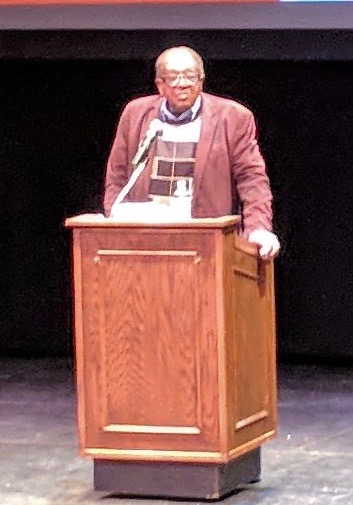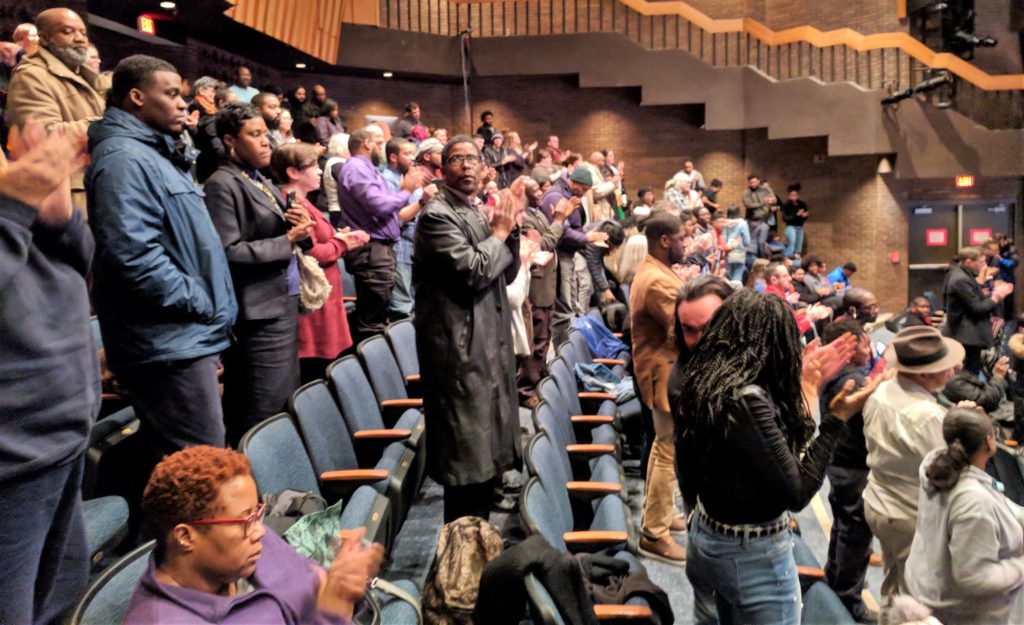By Paul Rozycki
As part of Black History Month, the U of M-Flint invited Black Panther Party founder Bobby Seale to address students, faculty, and the public on Monday night. The 1960s activist spoke to a full house at the UM-Flint Theater in a presentation that ranged from the familiar to the radical.

Bobby Seale at UM – Flint (Photo by Paul Rozycki)
The 1960s radical, now in his 80s, began in a quiet manner describing his early days in Texas, his work in the construction business, his time in the Air Force and his days working for the city of Oakland, California for an anti-poverty program. Only later in his life did he begin to delve into African-American history, and become the activist who created the Black Panther Party.
He described his initial reaction to the police, when he was arrested for reciting what was called an “obscene” poem on one occasion in California. After narrowly avoiding significant jail time, he joined with Huey P. Newton and others to found what became the Black Panther Party. After the Watts riots in 1965, the members of the party came together to “observe the police” and to defend themselves against the police, with weapons if necessary. Seale said that in conflict with the police at least 22 members of the Black Panther Party were killed and that at least 14 police were shot as well. Seale said “I know guns” as he described the Panther’s attempts to defend themselves.
According to Seale, the Panthers started with only 28 or 29 members of the party in 1966, on his birthday. Then in the months after the assassination of Martin Luther King Jr. in 1968 it grew to over 5000 members.
Though the Black Panthers image was often that of an armed Black man, Seale said that the party was more than that. It was also a grassroots organizing force, encouraging African-Americans to vote and run for office and speak out on many issues. And he said it was a community support organization that provided breakfasts and food banks for many.
Though one might have expected an angry speech out of the 1960s racial conflicts, Seale’s presentation was much quieter than one might have expected. In addition to his goals of reaching racial equality through electoral politics, he came out strongly for cleaning up the environment, gay rights and economic opportunity. He urged his listeners to learn how to organize and form coalitions with other groups to help elect more progressive politicians.
He said that he would like to be able to use his construction skills to help others to form companies that would build low income housing for the poor. He is also working on his own film about the Black Panthers and the Chicago Seven, where anti-Vietnam war protesters were put on trial for their role in protesting the war and the Democratic convention in 1968. Seale was the eighth member of the group but was removed by the judge during a very tumultuous trial.

Standing ovation for the Black Panthers founder at UM – Flint (Photo by Paul Rozycki)
In spite of his image as an angry radical, Seale told a story of how one member of the Panthers wanted to hang up a portrait of Soviet leader Josef Stalin during a meeting. Seale said, “I don’t want Stalin” up there, and offered to replace the portrait with Panther member Huey P. Newton.
At the conclusion of the presentation Seale took questions from the audience, some of whom had been in the Black Panther party and some who had relatives who were killed when they were attacked by police. He received a standing ovation at the conclusion of his presentation.
Prior to the presentation, Seale signed books in the lobby about the Black Panther Party.
The UM-Flint Intercultural Center and the Office of Educational Opportunity Initiatives sponsored the event.
EVM Staff Writer and political commentator Paul Rozycki can be reached at paul.rozycki@mcc.edu.



You must be logged in to post a comment.